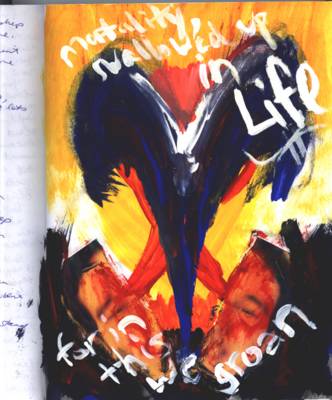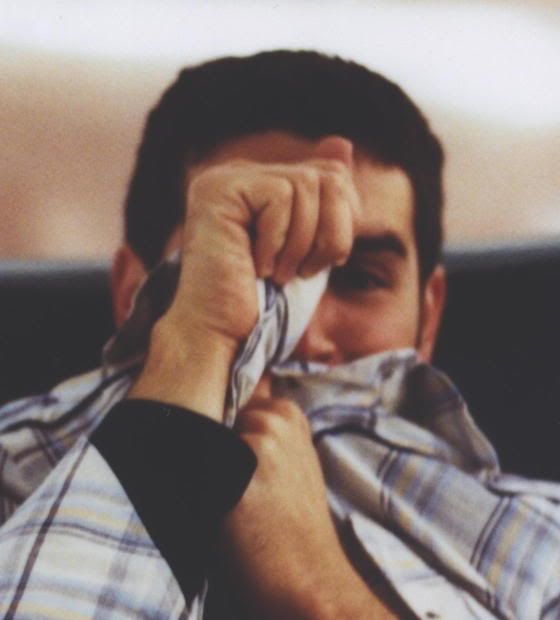Sunday, October 24, 2004
Soul and Body
from The Unbearable Lightness of Being by Milan Kundera:
When will my soul flood out to the surface and express itself through the medium of my flesh? Isn't that something we're waiting for in Heaven? When our bodies are resurrected and restored to Life, will they then match the depths, the intricacies, the minutia of our spirits?
There's muscle in my shoulders and arms. I see it when I'm fixing my hair in the mornings. There's tone and definition under the softness on my stomach. It shows through in my heavy breathing after sit-ups.
If I worked out, these muscles would grow, would come to the surface and change the way I look. Would they change the way I look at myself? How others look at me?
Would it further align my body with my spirit?
Somewhere beneath all of my weaknesses is an Heir to the Throne of God.
Is he muscular? Is it the fat that's keeping him imprisoned?

II Corinthians 5
A long time ago, man would listen in amazement to the sound of regular beats in his chest, never suspecting what they were. He was unable to identify himself with so alien and unfamiliar an object as the body. The body was a cage, and inside that cage was something which looked, listened, feared, thought, and marveled; that something, that remainder left over after the body had been accounted for, was the soul.
Today, of course, the body is no longer unfamiliar: we know that the beating in our chest is the heart and that the nose is the nozzle of a hose sticking out of the body to take oxygen to the lungs. The face is nothing but an instrument panel registering all the body mechanisms: digestion, sight, hearing, respiration, thought.
Ever since man has learned to give each part of the body a name, the body has given him less trouble. He has also learned that the soul is nothing more than the gray matter of the brain in action. The old duality of body and soul has become shrouded in scientific terminology, and we can laugh at it as merely an obsolete prejudice.
But just make someone who has fallen in love listen to his stomach rumble, and the unity of body and soul, that lyrical illusion of the age of science, instantly fades away.
Tereza tried to see herself through her body. That is why, from girlhood on, she would stand before the mirror so often. And because she was afraid her mother would catch her at it, every peek into the mirror had a tinge of secret vice.
It was not vanity that drew her to the mirror; it was amazement at seeing her own "I." She forgot she was looking at the instrument panel of her body mechanisms; she thought she saw her soul shining through the features of her face. She forgot that the nose was merely the nozzle of a hose that took oxygen to the lungs; she saw it as the true expression of her nature.
Staring at herself for long stretches of time, she was occasionally upset at the sight of her mother's features in her face. She would stare all the more doggedly at her own image in an attempt to wish them away and keep only what was hers alone. Each time she succeeded was a time of intoxication: her soul would rise up to the surface of her body like a crew charging up from the bowels of a ship, spreading out over the deck, waving at the sky and singing in jubilation.
When will my soul flood out to the surface and express itself through the medium of my flesh? Isn't that something we're waiting for in Heaven? When our bodies are resurrected and restored to Life, will they then match the depths, the intricacies, the minutia of our spirits?
There's muscle in my shoulders and arms. I see it when I'm fixing my hair in the mornings. There's tone and definition under the softness on my stomach. It shows through in my heavy breathing after sit-ups.
If I worked out, these muscles would grow, would come to the surface and change the way I look. Would they change the way I look at myself? How others look at me?
Would it further align my body with my spirit?
Somewhere beneath all of my weaknesses is an Heir to the Throne of God.
Is he muscular? Is it the fat that's keeping him imprisoned?

II Corinthians 5

